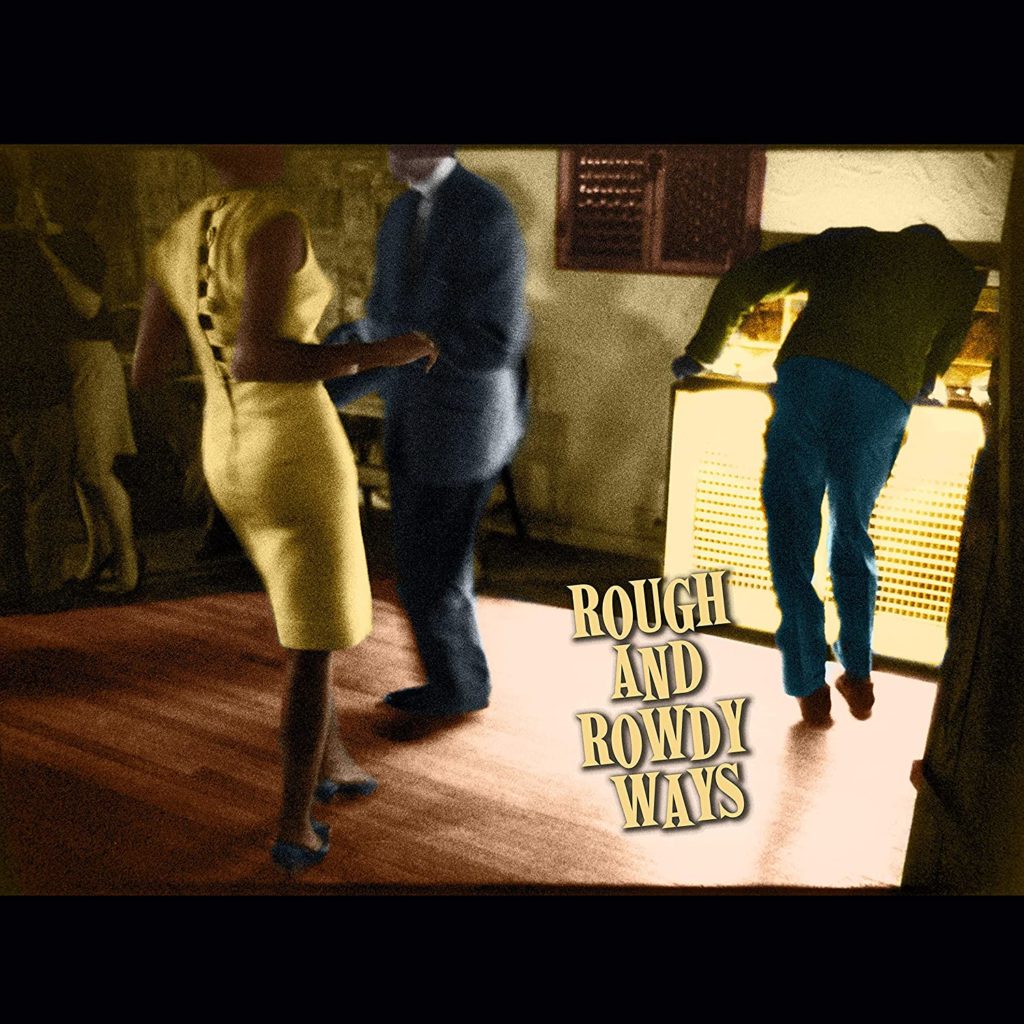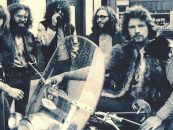 Bob Dylan has a habit of showing up with guns blazing just when you think he’s starting to fade. In 1974, for example, he followed a period that included relative disappointments like Self Portrait and Planet Waves with the stunning Blood on the Tracks. And a series of uneven albums in the 1980s and early 1990s preceded the arrival of the terrific Time Out of Mind in 1997.
Bob Dylan has a habit of showing up with guns blazing just when you think he’s starting to fade. In 1974, for example, he followed a period that included relative disappointments like Self Portrait and Planet Waves with the stunning Blood on the Tracks. And a series of uneven albums in the 1980s and early 1990s preceded the arrival of the terrific Time Out of Mind in 1997.
You could be forgiven if you thought in recent years that he was once again down for the count. His last album of original compositions, Tempest, had come out in 2012, after which he had issued only archival material and three collections of covers from the Great American Songbook. The famous chorus of 1964’s “My Back Pages” notwithstanding, moreover, he wasn’t getting any younger.
So it seemed reasonable to suspect that we’d seen the last of his greatest albums. But if that’s what you concluded, well, here comes Rough and Rowdy Ways, a superb collection of 10 new originals, to prove you wrong.
Unlike, say, Nashville Skyline or Blood on the Tracks, this 39th Dylan studio LP, which arrived on June 19, 2020, does not find him reinventing his vocal style or lyrical approach: if you’ve listened to the other collections of original material he has produced over the last couple of decades, you’ll find a familiar-sounding artist on Rough and Rowdy Ways. Though Dylan’s phrasing is arguably more subtle, precise and evocative than some of what we’ve heard from him in recent years, he’s still singing (and often half talking) in the rough, world-weary voice that has characterized his other 21st century albums. Many of his longtime lyrical preoccupations remain—especially mortality and love. And he’s still mixing up a unique musical brew whose ingredients include blues, country and rock ’n’ roll. His longtime band remains magnificent and in perfect step with his moods.
Listen to “Crossing the Rubicon”
He’s also still heavily into uncredited borrowing, though not to the extent that raised eyebrows regarding 2006’s Modern Times. As he has done since the beginning of his career (and as many other folk artists have done), he pulls ideas and phrases from umpteen sources and uses them as building blocks for something fresh. Here, he takes his album’s moniker from an old Jimmie Rodgers number, lifts the title of “Murder Most Foul” from Shakespeare’s Hamlet, and uses a Walt Whitman line for the title of “I Contain Multitudes.” Dylan also weaves in a line about “the winter of my discontent” and a verse from the Who’s Tommy. And the music for “False Prophet” has been said to derive directly from “If Lovin’ Is Believin’,” a 1954 Sun Records track by Billy “The Kid” Emerson.
Another habit that continues on Rough and Rowdy Ways is Dylan’s occasional penchant for using more plastic than necessary: the 71-minute album covers two CDs, with its longest track occupying all of disc two, though everything could have easily been accommodated on a single CD. His previous album, Triplicate, came on three discs but could have fit on two. (If it had, he would perhaps have been inclined to call it Duplicate.)
There are important differences between Rough and Rowdy Ways and Dylan’s other work over the past couple of decades, however. Most notably, this album seems to have been assembled more carefully. It also contains many more specific references to real places, things and especially people: he namechecks Leon Russell, Liberace, Julius Caesar, Jimmy Reed (the ostensible subject of a whole song), Allen Ginsberg, Sigmund Freud, Harry Truman, Karl Marx, and many other well-known figures.
Listen to “Goodbye Jimmy Reed”
In Dylan’s first-person lyrics, moreover, he seems to be speaking for himself—rather than giving voice to some fictitious protagonist—more than at any time since Blood on the Tracks. (“I go right to the edge, I go right to the end,” he proclaims at one point. “I sing the songs of experience like William Blake/I have no apologies to make.”) He also credits himself as producer rather than using his frequent Jack Frost pseudonym for that role.
“The lyrics are the real thing, tangible, they’re not metaphors,” Dylan told Douglas Brinkley in a recent New York Times interview. Maybe so, but they’re still sometimes as enigmatic as we’ve come to expect from Dylan. Of course, Dylan being Dylan, that doesn’t make them any less fascinating, memorable, quotable or, at times, humorous. Virtually every number is loaded with wit, wordplay and evidence of this Nobel laureate’s wild imagination.
Related: Dylan is still the colossus
The record’s first track, the understated, percussion-free “I Contain Multitudes,” features a soft blend of strings, pedal steel and guitar and sets the dreamlike, death-haunted tone for much of the album with its opening lines: “Today and tomorrow and yesterday too/The flowers are dying like all things do.” Later in the same song, Dylan compares himself—all in one verse—to Anne Frank, Indiana Jones and “them British bad boys,” the Rolling Stones. He also rhymes the song title with “nudes,” “feuds,” and—in an apparent reference to David Bowie—“all the young dudes.”
Another standout is the melodious “I’ve Made Up My Mind to Give Myself to You,” a touching and complex statement of devotion that echoes the lyrical intensity of songs like Empire Burlesque’s “I’ll Remember You.” Here, Dylan sings of traveling “a long road of despair” and confides, “I’ve seen the sunrise, I’ve seen the dawn/I’ll lay down beside you when everyone’s gone.”
And then there’s the accordion-flavored “Key West (Philosopher Pilot),” a brilliant, rambling ballad that appears to be about an old man, perhaps on his deathbed. He was “born on the wrong side of the railroad track” and “never lived in the land of Oz” but has now found some kind of peace in Key West, which he calls “the place to be if you’re looking for immortality.”
Listen to “Key West (Philosopher Pirate)”
This album’s centerpiece is “Murder Most Foul,” the longest song Dylan has ever recorded. (“Highlands,” on Time Out of Mind, is only 23 seconds shorter, but such epics as “Tempest,” “Just Like a Woman,” “Joey” and “Brownsville Girl” all wind down well before this one does.) Dylan talks/sings over piano and mournful, dirge-like strings, offering a sprawling and intriguing lyric that uses the assassination of President John F. Kennedy—an event that has interested him for years—as a jumping-off point for a romp through an American dream world.
“It was a dark day in Dallas, November ’63/A day that will live on in infamy,” Dylan begins. “President Kennedy was a-ridin’ high/Good day to be livin’ and a good day to die.” Subsequent verses continue the assassination theme with references to the grassy knoll, the Zapruder film, the swearing in of Lyndon Johnson, Lee Harvey Oswald and Jack Ruby, but Dylan also manages enough sidetracks to mention everything from Gone with the Wind, the Aquarian Age and Marilyn Monroe to Wolfman Jack, The Birdman of Alcatraz, Lindsey Buckingham and The Merchant of Venice. He also names more than 70 songs, ranging from “Ferry ’Cross the Mersey” and “Down in the Boondocks” to “Moonlight Sonata” and “That Old Devil Moon.”
What does it all mean? Well, in his 1966 Playboy interview with Nat Hentoff, Dylan famously answers a question about what his songs are about by saying, “Oh, some are about four minutes, some are about five, and some, believe it or not, are about 11 or 12.” The best answer regarding “Murder Most Foul” might be that it’s “about 17.” At any rate, it works beautifully, much as an equally wild blizzard of words worked back in 1965, on Highway 61 Revisited‘s classic “Desolation Row.”
Tickets to see Dylan are available here and here. His recorded legacy is available in the U.S. here and in the U.K. here.






1 Comment so far
Jump into a conversationPLANET WAVES a “disappointment”? Wow! Guess we live in different realities …